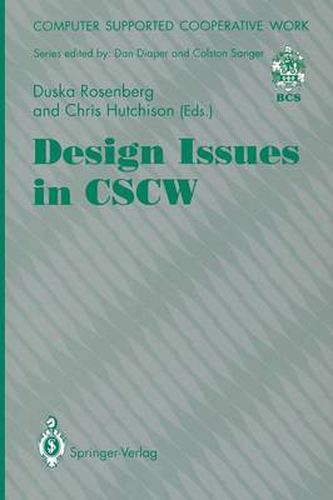Readings Newsletter
Become a Readings Member to make your shopping experience even easier.
Sign in or sign up for free!
You’re not far away from qualifying for FREE standard shipping within Australia
You’ve qualified for FREE standard shipping within Australia
The cart is loading…






This title is printed to order. This book may have been self-published. If so, we cannot guarantee the quality of the content. In the main most books will have gone through the editing process however some may not. We therefore suggest that you be aware of this before ordering this book. If in doubt check either the author or publisher’s details as we are unable to accept any returns unless they are faulty. Please contact us if you have any questions.
One of the most significant developments in computing over the last ten years has been the growth of interest in computer based support for people working together. Recognition that much work done in offices is essentially group work has led to the emergence of a distinct subfield of computer science under the title Computer Supported Cooperative Work (CSCW). Since the term was first coined in 1984, there has been growing awareness of the relevance to the field of, and the valuable con tributions to be made by, non-computing disciplines such as sociology, management science, social psychology and anthro pology. This volume addresses design issues in CSCW, an- since this topic crucially involves human as well as technical considerations - brings together researchers from such a broad range of disciplines. Most of the chapters in this volume were originally presented as papers at the one-day seminar, Design Issues in CSCW , held at the Department of Trade and Industry (DTI), London, on 17 March 1992, one in aseries of DTI-supported CSCW SIG seminars. We would like to express our gratitude to the series editors, Colston Sanger and Dan Diaper, for their useful comments on, and suggestions for revisions to, the final draft of the manuscript; to Linda Schofield, our editor at Springer, for her continued encouragement throughout the preparation of the manuscript; and, finally, to our respective families for their support and patience over so many months.
$9.00 standard shipping within Australia
FREE standard shipping within Australia for orders over $100.00
Express & International shipping calculated at checkout
This title is printed to order. This book may have been self-published. If so, we cannot guarantee the quality of the content. In the main most books will have gone through the editing process however some may not. We therefore suggest that you be aware of this before ordering this book. If in doubt check either the author or publisher’s details as we are unable to accept any returns unless they are faulty. Please contact us if you have any questions.
One of the most significant developments in computing over the last ten years has been the growth of interest in computer based support for people working together. Recognition that much work done in offices is essentially group work has led to the emergence of a distinct subfield of computer science under the title Computer Supported Cooperative Work (CSCW). Since the term was first coined in 1984, there has been growing awareness of the relevance to the field of, and the valuable con tributions to be made by, non-computing disciplines such as sociology, management science, social psychology and anthro pology. This volume addresses design issues in CSCW, an- since this topic crucially involves human as well as technical considerations - brings together researchers from such a broad range of disciplines. Most of the chapters in this volume were originally presented as papers at the one-day seminar, Design Issues in CSCW , held at the Department of Trade and Industry (DTI), London, on 17 March 1992, one in aseries of DTI-supported CSCW SIG seminars. We would like to express our gratitude to the series editors, Colston Sanger and Dan Diaper, for their useful comments on, and suggestions for revisions to, the final draft of the manuscript; to Linda Schofield, our editor at Springer, for her continued encouragement throughout the preparation of the manuscript; and, finally, to our respective families for their support and patience over so many months.